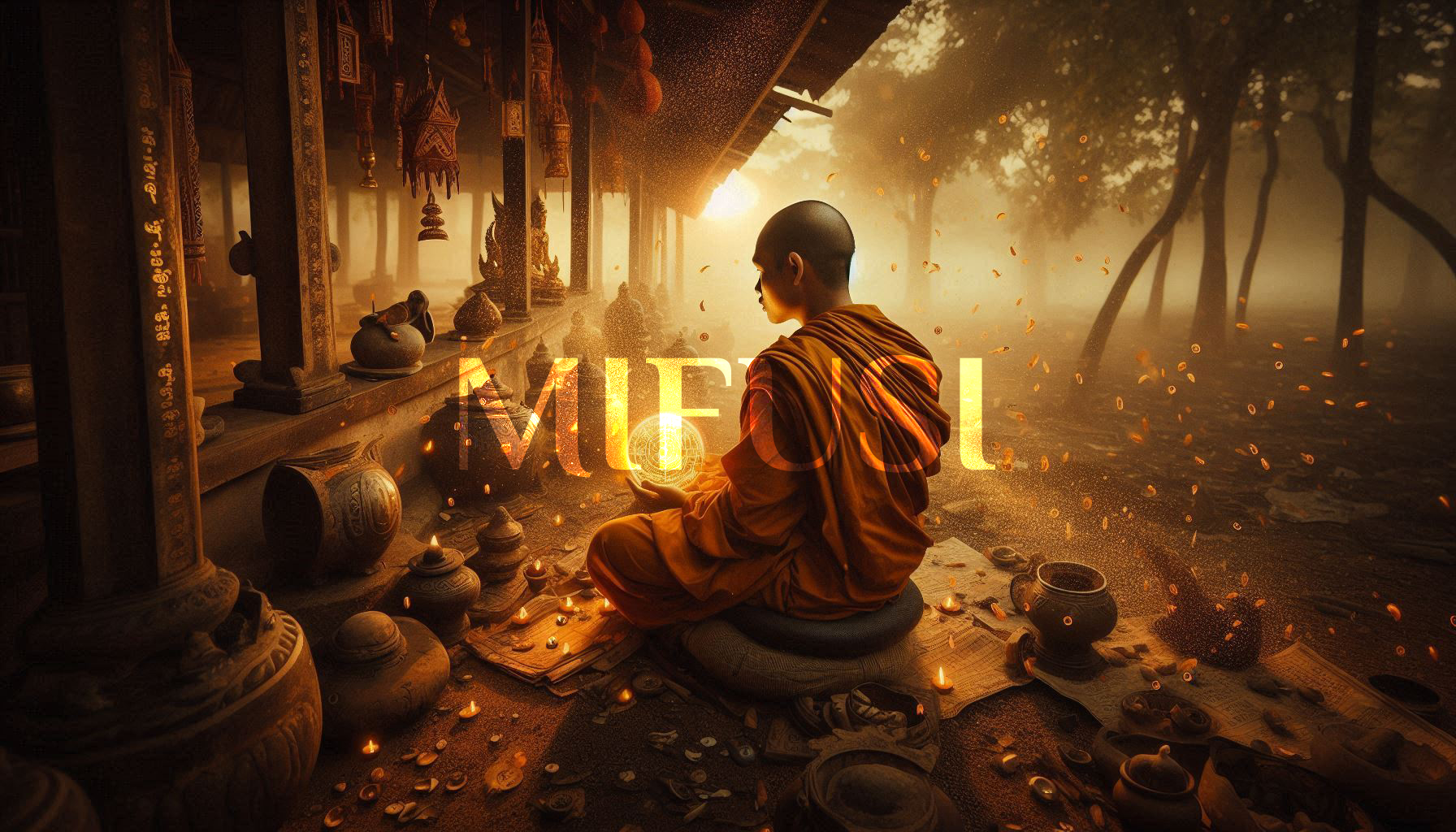Story 1 – Mystical tales and its principles Old-Guru
Câu chuyện số 1 – Chim Đa Đa coi bói – by ThầyGià – 12 November 2008, 05:06 – edited by Horangi
(1) The story about monk Dada (Alias):
Dada is a Vietnamese with Cambodian ancestry, the son of very poor parents. At the tender age of 7, he began his monastic training at a Khmer temple in Soc Trang.Around the age of 13 or 14, during one occasion, he and a fellow monk fled the temple to visit his friend’s village. His friend, well acquainted with the villagers, devised a plan for him to deceive them through fortune-telling in order to earn money. Naturally, his predictions were astonishingly accurate, earning him admiration from many.
However, his luck seemed to wane when a family, having recently lost a buffalo, approached him for a reading to find their animal. Clueless and seeking to buy time, Dada told the man he would perform the divination the following day.
That evening, the two schemers racked their brains for a solution but to no avail, increasingly worried that the entire village would discover their ruse and curse them.
Tossing and turning all night, fretting over the worst, Dada invoked the names of all the gods and goddesses from traditional folklore he believed in. He prayed to the village chief spirit, the local earth god, and all the genies and underworld spirits for salvation until exhaustion overtook him, and he dozed off. He then dreamed of floating above the ground, crossing numerous uncultivated fields until he stopped in front of a rotten tree stump. A voice from the stump revealed the stolen buffalo’s precise location.
Awakening before he could verify the dream’s information, the man with the lost buffalo was already there, pressing for the reading. Dada relayed the location given in his dream.
Unexpectedly, the buffalo’s owner found and retrieved his lost animal. Grateful, he rewarded Dada with enough money for the two mischievous young monks to buy tickets back to the temple.
Since that event, Dada has gradually become famous for his fortune-telling, offering very accurate predictions and continuing to earn money through this skill.
Thoughts to consider:
Old_Guru invites readers to speculate on the identity of the spirit assisting the monk. How audacious must this spirit be to openly challenge Sakyamuni Buddha by aiding a disciple in making money through fortune-telling? This disciple then used the earnings to study magic under more than 90 renowned Cambodian gurus (details to follow) and ultimately became the head monk of a significant pagoda in Cambodia. What is the nature of this quirky character: benevolent or malevolent?
Until next time
Old_guru 08-12-08
Comments for the story:
The story about monk Dada- Divination (Translated from Phân tích- Câu chuyện số 1 Chim Đa Đa coi bói* by Akira, witten by Kỳ Hương cư sĩ 09 Jul. 2018.)
When Old_Guru tells the story “Chimdada fortune-telling”, he wants to emphasize the doctrine of Lesser Vehicle Buddhism, which is an atheistic doctrine. This doctrine revolves around the rejection of souls and spirits, regarding fortune-telling as superstition and delusion, believing that everything happens due to the mind’s creation, karmic forces, or causality, and that demons and deities are external evil spirits, while gods, even bodhisattvas and heavenly beings, cannot help sentient beings.
Indeed, the story of CDD reveals the fallacy of those doctrines. Despite being a devoted disciple of Buddha Shakyamuni, CDD defies the teachings of the Buddha by earnestly seeking divine assistance from all the spirits known in folklore, ultimately achieving remarkable results.
Such outcomes not only affirm the existence of spirits but also demonstrate their capacity to assist humans. They validate that fortune-telling transcends mere superstition, as accurate predictions can be made with divine intervention. Moreover, they challenge the notion that “everything is created by the mind.” The mystical occurrences witnessed by CDD and others defy simple explanation as products of human imagination. How could the human mind conjure spirits, demons, bodhisattvas, and the vast universe itself? The universe and all its inhabitants are creations of the Creator and the Holy Spirit, with Buddhas across the ten directions playing their part, while humans possess the intellect to explore the existing realities within the universe.
The Buddhist monks, outwardly devout followers of the Buddha and his teachings, harbor a secret practice of occultism derived from the Realm of Underworld Spirits. These esoteric rituals draw a significant following among Buddhists, mirroring the success of CDD, whose accurate fortune-telling, aided by underworld spirits, propelled him to the position of head abbot in a prominent temple.
Even figures like Thich Nhat Hanh, Thich Thanh Tu, and the Supreme Patriarch Thich Vien Duc clandestinely sought guidance from Master Tich Chieu, an Esoteric Buddhist practitioner. Additionally, Thich Vien Duc pursued magical teachings from Mr. Năm, another adept in Esoteric Buddhism. While practitioners of various religions resort to magical rites to attract followers, they seldom openly acknowledge it. Instead, they attribute their mystical abilities to meditation practices or devotion to Buddha Shakyamuni, among other explanations.
Question 1: The notion of “Demonic Realm”
Old_Guru posed a challenging question with a touch of humor: “Who is the invisible ‘fellow’ assisting the monk?” This lighthearted inquiry playfully acknowledges the monk’s unseen helper, hinting at its potentially lower rank in the Demonic Realm. While such distinctions hold little significance for Old_Guru, they carry weight among monks and Buddhist followers. It’s crucial for them to grasp the nuances of the Demonic Realm and avoid misinterpreting its denizens as mere evil spirits of lesser stature than humans. Instead, it’s more aptly termed the Underworld Realm, encompassing various ranks of deities within the Supervisory Court. These beings serve as guardians akin to law enforcement officers, upholding divine law rather than embodying demonic traits.
Understanding this hierarchy is essential, as venerable monks, supreme patriarchs, head abbots, and even the Pope are subject to supervision by the underworld spirits. This hierarchy, also called the five armies of heaven, administers punishment and reward according to divine law.
Question 2: Who is the invisible entity vying for discipleship alongside Buddha Shakyamuni?
Answer: Contrary to popular belief, there isn’t an invisible entity competing for followership with Buddha Shakyamuni. Instead, disciples like monk CDD willingly turn to underworld spirits, earnestly seeking their assistance.
Despite Buddha Shakyamuni’s revered status in Buddhism as the Teacher of Gods and Humans and the embodiment of the Truth of the Universe, in this scenario, he loses his disciples to the spirits due to their perception of his apparent lack of power to aid them.
Organized religions such as Buddhism and Christianity often harbor a fear of losing followers to alternative beliefs. To safeguard their adherents, they erect doctrinal barriers, critique other faiths, and label them as demonic or heretical. They even go so far as to categorize deities from rival religions as outsiders and malevolent entities, ensuring that their followers remain steadfast in their own teachings.
The statement “Who dares to take disciples from Buddha Shakyamuni,” uttered by the Old Guru in jest, reflects the possessive attitude of some Buddhist clergy members who assert ownership over disciples. From their perspective, when individuals like CDD seek assistance from spirits, it’s perceived as these spirits “taking” disciples away from Buddhism. The clergy fears that spirits may lead their followers astray, steering them towards the practice of sorcery under the guidance of shamans, thereby diverting them from the correct Buddhist path of mindfulness and liberation.
Question #3: Is the spirit assisting CDD considered righteous or malevolent?
Answer: This question serves to elucidate the nuanced concept of good and evil within mysticism. In accordance with Buddhist teachings, all underworld spirits are typically viewed as malevolent entities. When CDD recounts his journey into the realm of magic, he often describes it as delving into the realm of the “dark powers.” However, followers of the Old Guru’s Secret Teachings hold a different perspective. They perceive spirits in the Demonic Realm as akin to a national security force, a correctional facility, or mentors guiding junior officers, with various ranks of spirits resembling educators in elementary education.
For spiritual practitioners to have a spirit as their guardian, guiding them along their path, is considered a significant blessing. Otherwise, they may find themselves merely delving into ancient texts that propagate erroneous theories about souls, deities, and spirits, mistaking falsehoods for truths. The longer one adheres to such misconceptions, the further they stray from the authentic spiritual path.
Underworld spirits themselves neither embody righteousness nor malevolence; these attributes are inherent to human beings. The actions of spirits are governed by divine law, acting favorably towards those with good intentions. They lead honest individuals to genuine teachers, while those with ill intentions may encounter deceitful imposters. A righteous mindset earns consideration from underworld spirits, while malevolent intentions may result in punishment from them.
Through virtuous deeds and sincere practice, practitioners may ascend to learn from higher spiritual beings such as celestial beings, the holy Spirits, Buddhas and Boddhisattvas… thus advancing along the path of enlightenment.
Hoctro_gia
Related Post
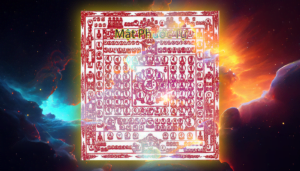
Chapter VI: V & VI – The Cundi Dharani spoken by the Mother of Seven Kotis Buddhas
V. The Cundi Dharani spoken by the Mother of Seven Kotis Buddhas Tang Dynasty, India, Tripitaka master Amoghavajra translated from...
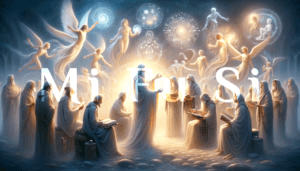
Invisible Deities of Career
Invisible Deities of Career (Tổ vô hình các ngành nghề submitted by Khánh-am on 24 Mar 2009 - translated by...
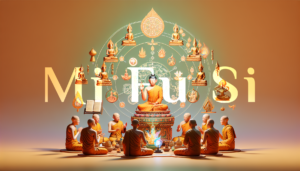
The Singular Source of Religions
The Singular Source of Religions (Tất cả tôn giáo đều cùng một nguồn gốc by DongVan on Sat Jun 26,...

Chapter I: V – MANDALA (Part 5/6)
V. MANDALA: Mandala or 'Dan' or Bodhi Mandala is a complex term. It literally means donation, gift, generosity, or a...
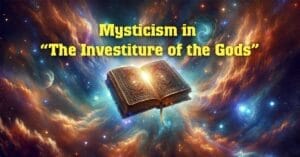
RELIGIOUS VIEWS ON THE ORIGIN OF LIFE AND THE UNIVERSE
In attempting to study religion, people often get frustrated and have much to think about the many serious controversial religious...

THE BIRTH OF NEZHA AT CHENTANG PASS
This chapter is about Sir Tai Yi residing in the Golden Light Cave of Mount Qianyuan, an Immortal who has...

JIANG ZIYA BURNS THE “JADE LUTE” DEMON
In the Huang-Ti grave at the South Gate lived a Demon called Jade Lute, a friend of Daji. They had...
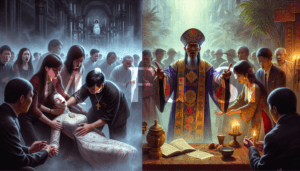
MY AUNT’S SPIRIT POSSESSION
MY AUNT'S SPIRIT POSSESSION (Quỷ nhập- Câu chuyện ôn tập lời dạy của Tổ, Thầy by Bạch Hạc on Wed...
